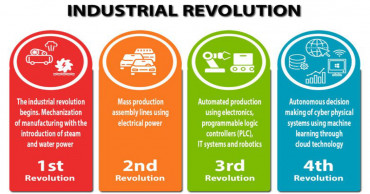Fourth Industrial Revolution (4IR)
Govt to focus on labour-intensive industries along with technology: PM Hasina
Prime Minister Sheikh Hasina on Thursday said the government wants to blend Fourth Industrial Revolution with labour intensive industries aiming to create employment opportunities for a greater number of people in the country.
“Technologies are changing every moment, now Fourth Industrial Revolution (4IR) is knocking at the door. May be we will need less manpower, but we have to use technology, information technology. For that we need skilled manpower,” she said.
The prime minister was distributing cheques of "Bangabandhu Science and Technology Fellowship," "National Science and Technology Fellowship" and special research donations among teachers, scientists, researchers and students of different universities.
The Science and Technology Ministry arranged the ceremony at Osmani Memorial Auditorium.
Hasina said that the government does not want to embrace 4IR completely.
“But we do not want to go that direction completely; we want to set up labour intensive industries also. Because we have to ensure employment of the huge population. So blending with these two we have to advance our country, that must be kept in your mind,” she said.
The PM requested the researchers to do their work with utmost sincerity and she expressed her eagerness to be informed about the outcome of these researches time to time.
She reiterated her call to give special focus on medical science research, urging all to move the country forward with fresh inventions to cope with the newer global technologies.
“I can say with sadness that though research on agriculture and science is going on, but our research on medical science is fewer in number. Give special attention to medical science research which is required greatly,” she said.
3 years ago
More opportunities than challenges in 4IR: Experts
Speakers at a webinar here on Tuesday said there is a risk of job loss due to the emergence of 4IR, but the opportunities, including the creation of more jobs, are enormous.
They also said if the opportunities are effectively utilised it would help create jobs double than the jobs loss.
Bangladesh e-Government Computer Incident Response Team (BGD e-Gov CIRT) organised the virtual programme titled `Fourth Industrial Revolution (4IR): Challenges and Opportunities’.
Read: Voluntary disclosure of information helps establish good governance: Speakers
IT-ITES Policy Adviser of LICT Project Sami Ahmed presented the keynote paper at the programme.
Addressing the programme, National Data Centre Director Tarique M Barkatullah said the government will hold a series of discussions on the issues relating to 4IR and incorporate the suggestions of stakeholders and experts in formulating strategies in this regard to face challenges and utilize the opportunities of the fourth industrial revolution.
In his keynote paper, Sami Ahmed referred to the research conducted by Aspire to Innovate (A2I) Programme of ICT Division about 5.5 million job loss and creation of 10 million jobs due to the emergence of 4IR and said jobs will be created more than the prediction of job loss.
“The LICT project has also put forward a set of recommendations to the University Grant Commission (UGC) to change the academic curricula to cope up with the 4IR,” he added.
Read:Global deal on plastic pollution is urgent: Speakers
The frontier technology-based innovations and startups would contribute to creating the scope of jobs in different areas, including health, agriculture, education, finance, Sami said. “The government has been providing funds for innovations and startups to increase investment in the sector and promoting research and development.”
Mentioning the government’s preparation for future works, including the establishment of Sheikh Hasina Institute of Frontier Technology (SHIFT), Sheikh Kamal IT Institute and Incubation Centre, Centre for 4IR, Leadership Academy, he said all these activities are being implemented keeping 4IR challenges and opportunities in mind.
Sami also said frontier technology would be one of the biggest catalysts for turning Bangladesh into a developed country by 2041 and the government is working to ensure the optimal use of it. “Nearly three million people are expected to be provided training to build capacity on 4IR in the next five years,” he added.
4 years ago
Steps sought for re-skilling, upskilling of RMG workers to face 4IR challenges
Bangladesh Garment Manufacturers and Exporters Association (BGMEA) President Faruque Hassan has requested the Ministry of Labour and Employment to consider ways of how the central fund could be effectively used to ensure more welfare of garment workers.
Leaders of BGMEA led by President Faruque Hassan met Ehsan-E-Elahi, secretary, the Ministry of Labour and Employment at the secretariat on Tuesday and discussed relevant issues.
Read:BGMEA urges govt to speed up airport dev projects
BGMEA Vice President Shahidullah Azim and Vice President Miran Ali were also present at the meeting.
They had discussion on the overall situation of the RMG industry including workplace safety, workers’ welfare and skills development.
The BGMEA leaders thanked the government for providing support in carrying out skills development programs for the RMG industry.
Read: BGMEA calls for urgently fixing inoperative scanners at airport
They also stressed on the need for taking more initiatives to equip garment workers and employees with re-skilling, upskilling and knowledge to cope up with changing trends in the global apparel industry, especially brought by the Fourth Industrial Revolution (4IR).
4 years ago
Reskilling, up-skilling vital to avert 4IR backlash: Experts
Bangladesh urgently needs to overhaul its education system with a focus on technology and incorporating robotics into curricula to tackle the challenges to be posed by the ‘Fourth Industrial Revolution (4IR)’ by reskilling and up-skilling manpower, say experts.
6 years ago






